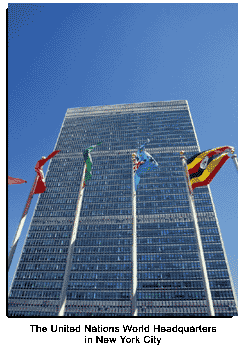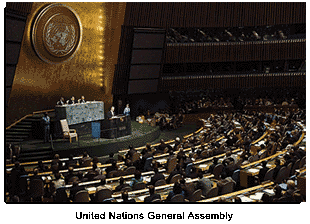The United Nations is an organization that traces its origins to the Allied opposition to the Axis powers during World War II. Its original purpose was similar to that of the failed League of Nations that grew out of World War I. The term was first used on January 1, 1942, by the then-26 nations who were at war with the Axis. On that date, they released a "United Nations Declaration." Franklin D. Roosevelt is regarded as the originator of the term. In October, 1943, a statement by the four primary anti-Axis nations (Britain, the United States, the Soviet Union, and China) declared their recognition of a need for an organization, after the war, to "maintain international peace and security."
 Plans were developed further and on August 21, 1944, representatives of the United States, Britain and the Soviet Union met at Dumbarton Oaks outside of Washington DC. They were joined later by China. Dumbarton Oaks was an 1801 Federal Style home which Mildred and Robert Woods Bliss purchased in 1920 and donated to Harvard in 1940. The Dumbarton Oaks conference agreed that the new postwar organization would be modeled very generally on the League of Nations, with a general assembly as well as a council in which the great powers would wield greater influence.
At Yalta, it was further agreed that the great powers would have veto power in the security council but would not exercise it for procedural questions. It was also agreed that all those countries that declared war on either Germany or Japan by March 1, 1945, would be eligible to join. It further specified that two additional Soviet socialist republics, specifically Ukraine and White Russia, would be admitted as full members of the General Assembly.
The final conference to complete the draft of a charter for the United Nations opened in San Francisco on April 25, 1945. The United States was represented by Edward R. Stettinius Jr., the Secretary of State, who presided. A total of 50 nations attended. Each proposed clause in the charter was debated and required a two-thirds vote of approval.
Plans were developed further and on August 21, 1944, representatives of the United States, Britain and the Soviet Union met at Dumbarton Oaks outside of Washington DC. They were joined later by China. Dumbarton Oaks was an 1801 Federal Style home which Mildred and Robert Woods Bliss purchased in 1920 and donated to Harvard in 1940. The Dumbarton Oaks conference agreed that the new postwar organization would be modeled very generally on the League of Nations, with a general assembly as well as a council in which the great powers would wield greater influence.
At Yalta, it was further agreed that the great powers would have veto power in the security council but would not exercise it for procedural questions. It was also agreed that all those countries that declared war on either Germany or Japan by March 1, 1945, would be eligible to join. It further specified that two additional Soviet socialist republics, specifically Ukraine and White Russia, would be admitted as full members of the General Assembly.
The final conference to complete the draft of a charter for the United Nations opened in San Francisco on April 25, 1945. The United States was represented by Edward R. Stettinius Jr., the Secretary of State, who presided. A total of 50 nations attended. Each proposed clause in the charter was debated and required a two-thirds vote of approval.
 The wartime alliance between the Soviet Union and the English-speaking Allies was coming under increasing strain, with disagreements about postwar policies becoming more evident. There were also splits between the Western democracies and the Communist bloc, between the industrially developed and developing nations, and the great powers and smaller powers, with the latter resenting the special treatment afforded to the great powers in the Security Council.
The charter was signed by all 50 countries on June 26, 1945. Poland, which had not been present, signed later to complete the list of 51 original countries. The United States Senate ratified by treaty by a vote of 89-2 on July 28. For the charter to become effective, the Big Five (USA, Britain, USSR, China, France) had to approve the charter plus a majority of the other 51. This was achieved on October 24, 1945, which has since been recognized as United Nations Day. The League of Nations was formally disbanded on April 18, 1946 in Geneva. This final act, giving the UN the assets of the league, which was signed by Sean Lester, the league`s final Secretary-General, consigned the League of Nations to history.
The wartime alliance between the Soviet Union and the English-speaking Allies was coming under increasing strain, with disagreements about postwar policies becoming more evident. There were also splits between the Western democracies and the Communist bloc, between the industrially developed and developing nations, and the great powers and smaller powers, with the latter resenting the special treatment afforded to the great powers in the Security Council.
The charter was signed by all 50 countries on June 26, 1945. Poland, which had not been present, signed later to complete the list of 51 original countries. The United States Senate ratified by treaty by a vote of 89-2 on July 28. For the charter to become effective, the Big Five (USA, Britain, USSR, China, France) had to approve the charter plus a majority of the other 51. This was achieved on October 24, 1945, which has since been recognized as United Nations Day. The League of Nations was formally disbanded on April 18, 1946 in Geneva. This final act, giving the UN the assets of the league, which was signed by Sean Lester, the league`s final Secretary-General, consigned the League of Nations to history.
Finding a permanent home for the United Nations required time and extended negotiations. The general assembly met in London in early 1946, and thereafter met at various temporary locations around New York City. Eventually, the UN accepted the offer by John D. Rockefeller of land in Manhattan on the East River. Construction of the distinctive United Nations headquarters was completed in 1952. It didn`t take long for the first international conflict to reach the Security Council. Iran soon complained that the Soviet Union was not abiding by its wartime understandings and had not withdrawn its troops from Iranian territory. The Security Council contented itself with encouraging the two parties to resolve the problem amicably. This was soon followed by the conflict in Palestine. With Britain unwilling to continue to administer its mandate, the United Nations was trying to implement a partition when fighting broke out. The outcome was a greater territory in the hands of the new nation of Israel than would have been granted by the UN, and also a refugee problem that was not yet resolved six decades later. The Soviet Union was unhappy with the proceedings of the United Nations in 1950 and instituted a boycott of meetings. They were thus boycotting the Security Council when North Korea invaded South Korea and could not veto a resolution authorizing the use of force to resist the invasion. In their absence, the Security Council voted the necessary resolution and, to prevent later obstruction by the Soviet, transferred management of the military forces to the General Assembly. The result of this was that the United States, although providing most of the men and materiel, did not itself declare war on North Korea. The charter of the United Nations gave more executive power to the Secretary-General than had been the case with the League of Nations. The first UN Secretary-General was Trygve Lie of Norway. The Soviet Union became unhappy with his actions with regard to Korea and withdrew their support. Lie resigned in 1953 and was replaced with Dag Hammerskjold of Sweden. Hammerskjold in turn got himself in Soviet bad graces by his activities regarding the Congo in the period of rapid decolonization of Africa after 1960. So upset were the Soviets that they proposed to end the position of Secretary-General and replace it with a triumvirate, which would represent the three major blocs in the UN and would consequently become completely ineffective. Before this proposal could be put through, a plane carrying Hammerskjold in the Congo crashed on September 18, 1961, killing him. As a gesture to the growing number of nations from the developing world, the candidacy of U Thant of Burma was put forward. The Soviet Union had little choice but to accept. The United Nations was the scene of a number of famous speeches during the Cold War. Fidel Castro made several addresses, condemning the United States. America`s ambassador to the UN Adlai E. Stevenson used the international forum to present the evidence of a Soviet buildup of missiles in Cuba. And Nikita Khruschev infamously pounded his shoe on his desk to interrupt a speech he didn`t like. The United Nations has continued to be the scene of contentious debate since the end of the Cold War, but it has become more and more involved through its various agencies in international developments far removed from military confrontation.